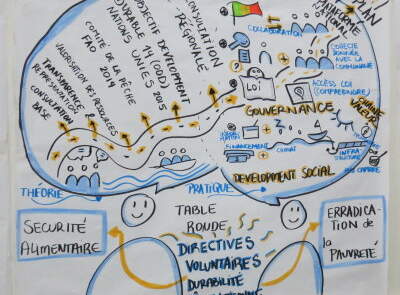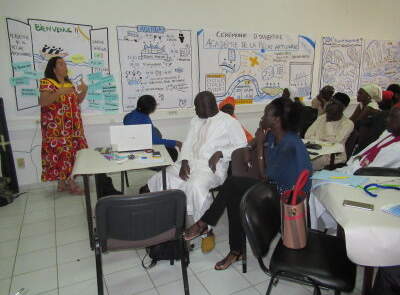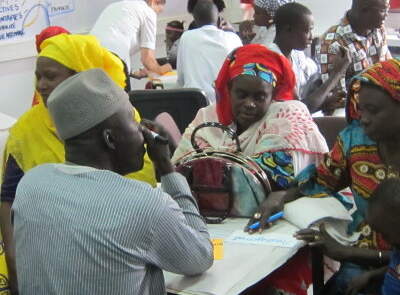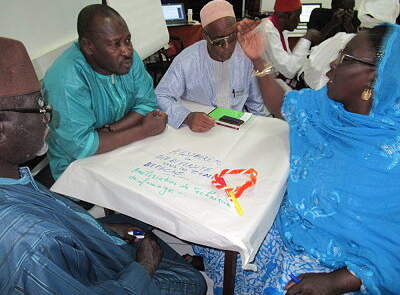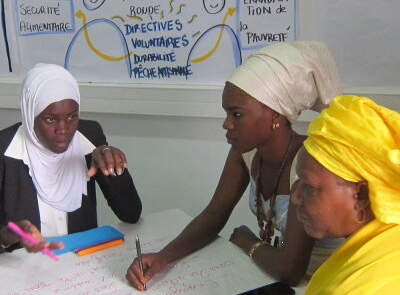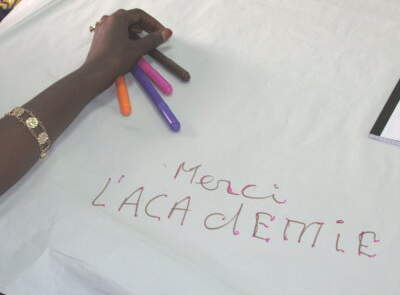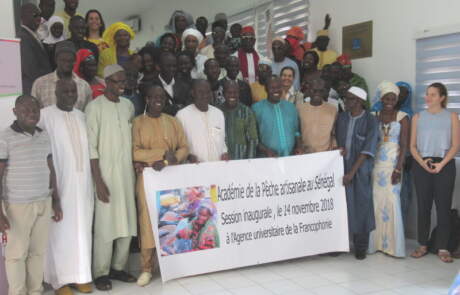All signs pointed into the direction of taking action – the Small-Scale Fisheries (SSF) Guidelines were adopted in 2014 by the FAO’s Committee of Fisheries and included in the Sustainable Development Goals in 2015. The vast research network “Too Big To Ignore” produced books and research results identifying obstacles and opportunities for implementation and a regional consultation in July this year developed concrete recommendations on how to implement them in West Africa. Our earlier work for FAO on a teaching kit on the ecosystem approach to fisheries and later field research underscored the demand of small-scale fishers (men and women) to get better access to research results, be recognised for their empirical knowledge and to be able to participate in action research driving analyses and innovation. So, the logical next step was teaming up with like-minded organisations and together launch a small-scale fisheries academy.
With active support of different professional associations organising people along all aspects of the value chain in the sector, academic partners and encouraged by other civil society organisations, the organising committee invited a wide array of sector stakeholders to the inaugural session of the academy. On 14 November 2018, the launch event was gracefully hosted by the Agence Universitaire de la Francophonie (AUF) in their regional West Africa office on the campus of Cheikh Anta Diop University in Dakar.
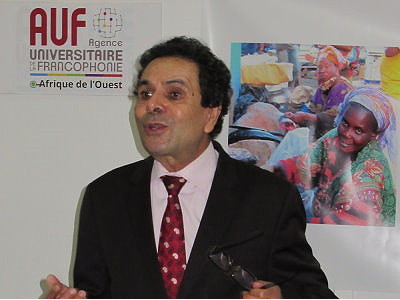
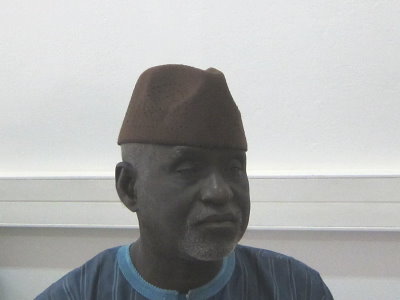
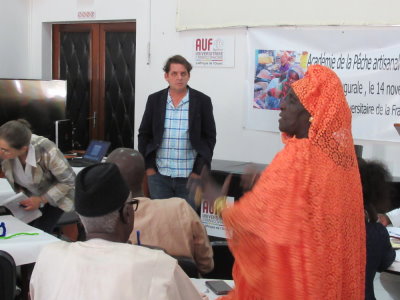
62 participants from all across Senegal joined the day-long deliberations. Following the words of welcome by the host, the members of the organising committee and representatives of the professional organisations, they all stood up one by one and spoke out loud their name, profession and location of main activities, thus revealing the diversity in the room.
The first part of the programme made sure that the people in the room had some shared understanding of the issues in contemporary small-scale fisheries in Senegal. The screening of the prize winning documentary “Poisson d’or, Poisson africain” by Thomas Grand and Moussa Diop about the conditions in the regional hub in Kafountine, Casamance, set the scene for that.
The update of the film with sequences from 2018, one year after finishing the main field work, showed the desolation that had arisen precipitously with the forced displacement of thousands of artisanal workers to make space for two Chinese fish meal factories. The update thus showed how the worst fears of the people interviewed in the main documentary had come true.
The lively exchange of impressions following the screening showed to which extend the film makers had faithfully captured the experiences of the majority of the audience.
The next step was to make sure, everybody was on the same page concerning the Small-Scale Fisheries (SSF) Guidelines. Originally, Fatou Sock, Officer at the Dakar Office of FAO and closely involved with the regional consultation about how best to implement the guidelines wanted to brief the participants about its results.
As she could not join in time, participants of the regional meeting from Senegal summarised the background and outcome to ensure that everybody in the audience was aware of the key recommendations.
These fall into three major groups: governance, social development and value chains. Climate change and disaster risks (chapter 9 of the SSF Guidelines) were considered throughout the discussions as cross-cutting issues.
All the while, the principal moderator Maria Fernanda Arraes Treffner had visually documented the flow of presentations and discussions through drawings on the walls in order to make sure that everybody in the audience could connect to the programme and the results of every point discussed.
Then it was time for a good practice example from Senegal to underline the feasibility of the guidelines and inspire thinking about how to amplify such experiences. Abdoulaye Ndiaye, National Coordinator of the Local Artisanal Fisheries Councils, reported about the successful development and implementation of a management plan for the marine protected area (MPA) in Ngaparou, the locality he was responsible for.
He insisted that such a management plan, developed with strong local participation was key to achieving the positive effects of the MPA. Moreover, the collaboration and mutual trust developed in the process enabled the community to take its restoration efforts further by establishing artificial reefs in order to diversify the habitat for valuable species. He also explained the importance of organising monitoring and surveillance to ensure enforcement of the rules.
With all these inputs, the focus shifted to the small-scale fisheries academy, its role, objectives and functioning.
The core concept revolves around the academy as a platform of free and respectful exchange, joint learning and co-production of knowledge shared by a wide variety of people and organisations who want to promote much needed social and technological innovation in prosperous and sustainable SSF.
Using participatory working methods and visual documentation, the fishers, women fish processors and marketers, the elders involved in conflict resolution, the young fishers, the scientists, the administration and representatives of public and civil society organisations had intense conversations. In three rounds they discussed the following questions:
 1. What do I need to improve my practices and make them more sustainable?
1. What do I need to improve my practices and make them more sustainable?
2. What would I like to receive from the academy? And which are my priority topics?
3. What can I offer to the academy? What can I do as from now?
During each round of approximately 30 minutes, the four people at each table discussed one of these questions, placing effort into listening attentively to ensure mutual understanding and identifying commonalities. Towards the end of the conversation time, the hosting team distributed coloured cards to collect the key ideas and results, which were then pinned to the wall. Participants were also encouraged to use the layers of paper on each table and the felt pens to take notes and write down additional detail of the conversation that might not fit on the cards.
For each new round of conversation, three of the four persons at the table were invited to get up and look for a new table to be able to exchange with other people as well. One person remained at the table to be the host. The role of the host was to ensure some continuity from one conversation round to the next.
At the end of the three rounds, volunteers read out the key comments and recommendations corresponding to each of the three questions so that they could be heard and seen by everybody in the plenary, commented upon and further clarified as required.
There was consensus that the Academy will be a space where everyone can express themselves freely and constructively. Perceived in this way, the Academy will be a space for reflection, training, experimentation and mutual enrichment between actors and actresses with varied profiles always aiming at the prosperous and sustainable future of small-scale fisheries. This will happen through the strengthening of local capacities and by contributing to the implementation of the guidelines.
The priorities for the start-up phase of the academy are now being analysed and will form the basis for curriculum development and the work plan of the academy as it is taken forward by a multi-stakeholder Committee. They are being published in the newsletter about the inaugural session.
Text by Cornelia E. Nauen with support by Aliou Sall, pictures by Thomas Grand and Aliou Sall.
Small-Scale Fisheries Academy
- Make Fishing Fair in the EU, 25 March 2025
- Human – Biodiversity Relationships Across Scales
- World Fisheries Day, 21 November 2024, celebrated in Nigeria
- Mundus maris participated in the 2024 World Fisheries Day organized by Canoe and Fishing Gear Association of Ghana (CaFGOAG).
- Mundus maris contribution to the UNOC3 public consultation
- Small-Scale Fisheries Summit in Rome, 5-7 July 2024
- Regional Symposium on European Small-Scale Fisheries, Larnaca, Cyprus, 1-3 July 2024
- Baltic Fisheries Emergency Meeting, Brussels, 26 June 2024
- Ambivalent role of Market and Technology in the Transitions from Vulnerability to Viability: Nexus in Senegal SSF
- Shell fisheries as stewardship for mangroves
- African edition of 4WSFC in Cape Town, 21 to 23 November 2022
- World Fisheries Day, 21 November 2023
- Webinar: Nigeria’s Fisheries challenges and opportunities
- Presenting the FishBase app at the Symposium in Tervuren
- MARE Conference on Blue Fear – Mundus maris reflects
- The Transition From Vulnerability to Viability Through Illuminating Hidden Harvests, 26 May 2023
- EGU sessions focused on geoethics and joint learning, 23-28 April 2023
- Solidarity with artisanal fishers in Senegal and Mauritania
- The legal instruments for the development of sustainable small-scale fisheries governance in Nigeria, 31 March 2023
- Tools for Gender Analysis: Understanding Vulnerability and Empowerment, 17 February 2023
- Community resilience: A framework for non-traditional field research, 27 January 2023
- Sustainability at scale – V2V November webinar
- European edition of 4WSFC in Malta, 12-14 September 2022
- Mundus maris contributes to SSF Summit in Rome
- Women fish traders in Yoff and Hann, Senegal, victims or shapers of their destiny?
- The Academy continues its work in Yoff
- Illuminating the Hidden Harvest – a snapshot
- Virtual launch event FAO: International Year of Artisanal Fisheries and Aquaculture
- The Small-Scale Fisheries Academy as a source of operational support to PA Guidelines
- World Fisheries Congress, Adelaide, 20-24 September
- Mundus maris supports the fight of Paolo, the fisher, in Tuscany, Italy
- Catching-up – SSF Academy Yoff, 27 Febr. 2021
- Strengthening capacities of the actors for sustainable small-scale fisheries
- Testing training methods during the pilot phase of the SSF Academy in Senegal
- A premiere – launch of a Small-Scale Fisheries Academy in Senegal

